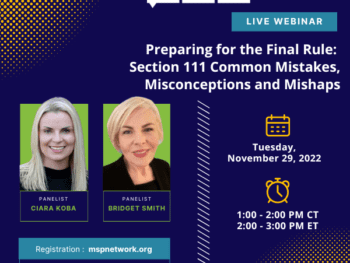
Directive To Deny Payment For Care Covered Under LMSA or NFMSA
The announcement comes via the issuance of a CMS MLN Matters article directed to physicians and other medical providers submitting claims to Medicare Administrative Contractors (MACs) for services to Medicare beneficiaries. It directs these MACs to deny payment for medical care that is covered under an LMSA or NFMSA as identified in the Common Working File (CWF).
To clear up some of these technical terms, MACs process Medicare Part A and B payments to medical providers on behalf of Medicare. A Common Working File (CWF) is maintained by the CMS Benefits Coordination and Recovery Center (BCRC) and contains information on a particular claimant’s Medicare eligibility and, importantly, when Medicare should be considered secondary such that payment to a medical provider should be denied and directed instead to the primary plan.
BCRC presently keeps records of all WCMSAs that have been approved by CMS and funded through settlement (This is why CMS requires final settlement documents be submitted to BCRC post-settlement). The WCMSA funding information is placed in the CWF so that the MACs deny payment for medical care associated with the WCMSA until the WCMSA is exhausted. This directive from CMS makes this same process applicable to LMSAs and NFMSAs.
How Can Medicare Deny Payment Based on Processes That Don’t Exist?
In response to this announcement, you would be correct in asking, how can CMS deny payment for medical care based upon an LMSA an NFMSA process that does not yet exist? Putting aside that some CMS Regional Offices have reviewed and approved LMSAs at their own discretion for quite some time, this does pose a very good question. CMS responds as follows:
CMS will establish two (2) new set-aside processes: a Liability Medicare Set-aside Arrangement (LMSA), and a No-Fault Medicare Set-aside Arrangement (NFMSA).
New Set-Aside Process Will Be Put In Place At Future Date
So CMS readily admits the new set-aside processes will be put in place at some point in the future. Such future date has already been tentatively set based upon CMS’s release, in December 2016, of its request for proposals for the new Workers Compensation Review Contractor which includes an optional provision to expand reviews to LMSAs and NFMSAs effective July 2018 (See prior blog post: CMS MSA Review Expansion to Liability Planned for 2018). Consequently, this directive to the MACs is implementing medical payment processing changes which will be required to be place once the LMSA/NFMSA review process is made available.
It is important to keep in mind that CMS has yet to release any guidance on such an expansion of the WCMSA review process to liability and no-fault and particularly how such a process would differ from that created for WC. Also note that CMS does not state that effective 10/1/2017 the MACs are to deny payment for all post-liability settlement injury-related medical care, rather, they are to “deny payment for items or services that should be paid from an LMSA or NFMSA fund.” The funds must exist for denial to occur. Accordingly, over 2017, as more pieces of the puzzle come together on CMS’s Liability and No-Fault MSA review policy, Tower MSA will provide further interpretation and guidance on what will be one of the most significant developments in MSAs since CMS formalized the WC MSA review process in 2001.

























